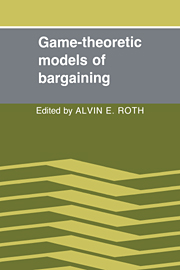Book contents
- Frontmatter
- Contents
- List of contributors
- Preface
- Chapter 1 Editor's introduction and overview
- Chapter 2 Disagreement in bargaining: Models with incomplete information
- Chapter 3 Reputations in games and markets
- Chapter 4 An approach to some noncooperative game situations with special attention to bargaining
- Chapter 5 Infinite-horizon models of bargaining with one-sided incomplete information
- Chapter 6 Choice of conjectures in a bargaining game with incomplete information
- Chapter 7 Analysis of two bargaining problems with incomplete information
- Chapter 8 Sequential bargaining mechanisms
- Chapter 9 The role of risk aversion in a simple bargaining model
- Chapter 10 Risk sensitivity and related properties for bargaining solutions
- Chapter 11 Axiomatic theory of bargaining with a variable population: A survey of recent results
- Chapter 12 Toward a focal-point theory of bargaining
- Chapter 13 Bargaining and coalitions
- Chapter 14 Axiomatic approaches to coalitional bargaining
- Chapter 15 A comment on the Coase theorem
- Chapter 16 Disclosure of evidence and resolution of disputes: Who should bear the burden of proof?
- Chapter 17 The role of arbitration and the theory of incentives
Chapter 6 - Choice of conjectures in a bargaining game with incomplete information
Published online by Cambridge University Press: 23 September 2009
- Frontmatter
- Contents
- List of contributors
- Preface
- Chapter 1 Editor's introduction and overview
- Chapter 2 Disagreement in bargaining: Models with incomplete information
- Chapter 3 Reputations in games and markets
- Chapter 4 An approach to some noncooperative game situations with special attention to bargaining
- Chapter 5 Infinite-horizon models of bargaining with one-sided incomplete information
- Chapter 6 Choice of conjectures in a bargaining game with incomplete information
- Chapter 7 Analysis of two bargaining problems with incomplete information
- Chapter 8 Sequential bargaining mechanisms
- Chapter 9 The role of risk aversion in a simple bargaining model
- Chapter 10 Risk sensitivity and related properties for bargaining solutions
- Chapter 11 Axiomatic theory of bargaining with a variable population: A survey of recent results
- Chapter 12 Toward a focal-point theory of bargaining
- Chapter 13 Bargaining and coalitions
- Chapter 14 Axiomatic approaches to coalitional bargaining
- Chapter 15 A comment on the Coase theorem
- Chapter 16 Disclosure of evidence and resolution of disputes: Who should bear the burden of proof?
- Chapter 17 The role of arbitration and the theory of incentives
Summary
Introduction
The axiomatic approach to bargaining may be viewed as an attempt to predict the outcome of a bargaining situation solely on the basis of the set of pairs of utilities that corresponds to the set of possible agreements and to the nonagreement point.
The strategic approach extends the description of a bargaining situation. The rules of bargaining are assumed to be exogenous, and the solution is a function not only of the possible agreements but also of the procedural rules and the parties' time preferences.
The aim of this chapter is to show that in the case of incomplete information about the time preferences of the parties, the bargaining solution depends on additional elements, namely, the players' methods of making inferences when they reach a node in the extensive form of the game that is off the equilibrium path.
The solution concept commonly used in the literature on sequential bargaining models with incomplete information is one of sequential equilibrium (see Kreps and Wilson (1982)). Essentially, this concept requires that the players' strategies remain best responses at every node of decision in the extensive form of the game, including nodes that are not expected to be reached. The test of whether a player's strategy is a best response depends on his updated estimation of the likelihood of the uncertain elements in the model. For nodes of the game tree that are reachable, it is plausible to assume that the players use the Bayesian formula.
- Type
- Chapter
- Information
- Game-Theoretic Models of Bargaining , pp. 99 - 114Publisher: Cambridge University PressPrint publication year: 1985
- 21
- Cited by



